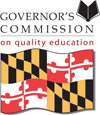
The Steele Commission Report: A Lost Opportunity To Debate Vouchers In Maryland
On September 14, 2005, the Governor’s Commission on Quality Education in Maryland, dubbed the “Steele Commission” because of its chairman, Lt. Gov. Michael S. Steele, released its final report—the culmination of a year-long investigation of Maryland’s K-12 public schools. While there are a number of both positive and troubling recommendations, the report fails to even mention school vouchers as a way to improve the educational prospects of children trapped in too many failing Maryland schools. This gross oversight represents a lost opportunity to have a broad-based voucher debate in the state, at a time when similar debates are taking place around the nation and successful voucher programs are in place.
Nevertheless, the report does have a number of positive recommendations. Specifically, the Steele Commission recommends the following policy changes be enacted:
• Charter School Reform
Maryland’s charter school law, widely cited as one of the worst in America, should be reformed to allow for more chartering authorities and fewer regulations of the schools themselves.
• Flexible Teacher Pay
Districts should have flexibility outside of the standard compensation ‘grid’ to pay teachers in hard-to-fill specialties, such as math, science, and special education. Additionally, teachers should be eligible for merit pay bonuses for high performance, like many top school administrators are eligible to receive.
• Simplified Alternative Certification
Another way to place more good teachers into classrooms, especially in hard-to-fill specialties, is to have streamlined paths to certification.
• A Renewed Focus on Helping Students Who Fall Behind
Schools should take additional steps to aid students who are not learning the most basic subjects, such as math and reading.
• Value-Added Testing
Maryland’s testing system should focus on how well the individual student is performing in core subjects, not on how well the school building is performing. To that end, value-added testing is a way to identify which students are falling behind, allowing teachers to formulate individualized plans to remediate such deficiencies quickly.
There are also some recommendations that are questionable:
• Schools as Comprehensive Social Service Providers
Maryland’s educational system should focus on its ‘core competency’ of educating the public, rather than increase the number of broader social services.
• Increased Bureaucracy for Early Childhood Education
The proposed accountability system for early child education and/or child care providers would likely increase the cost of such programs to parents and decrease the number of children enrolled. Such an action might be a prelude to mandatory, taxpayer-funded pre-kindergarten.
• College Awareness
The state should focus resources on making sure that every high school graduate has the necessary skills to perform well in business, vocational training, or higher education, rather than promote college via public service announcements.
To read our full report on the Steele Commission, please download the PDF version.





